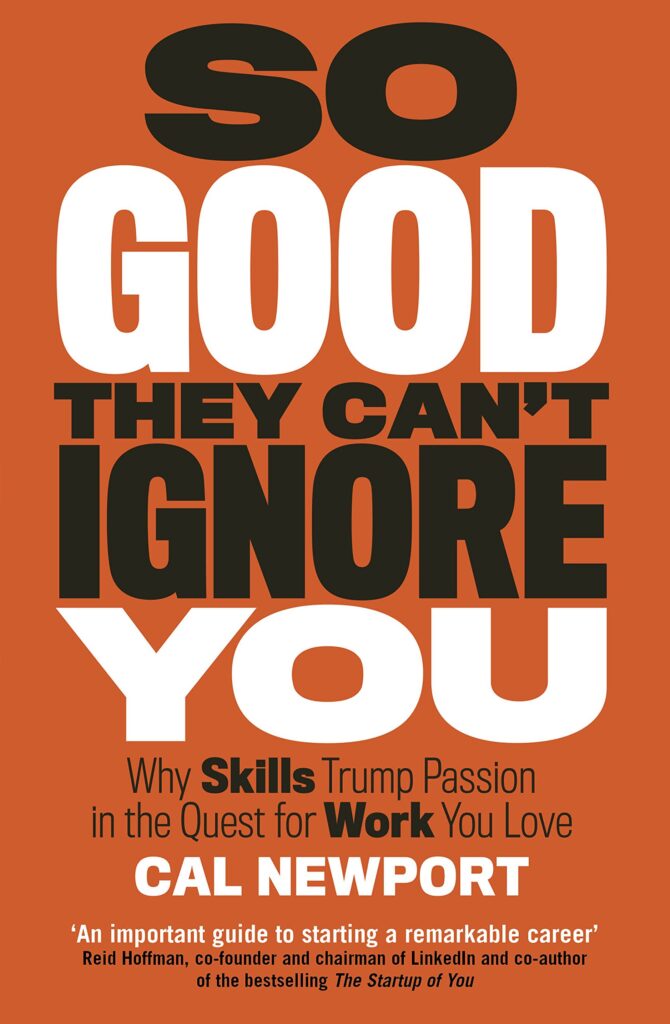When should we switch the Job? Insights from So Good They Can’t Ignore You
I had chance to read the book “So Good They Can’t Ignore You”. It gave answer to my long pending question “When should we switch the Job?“. That out of the way, Cal Newport prescribes four rules for picking a fulfilling career and provide career advice for better professional career.
Rule #1: Don’t Follow Your Passion
Most of the people don’t know what they are passionate about. What excites you today may or may not be will excite you in future. People decided that their mild interest as their passion without any skill on that domain. For instance, everyone like film industry and few people decides that acting is passion for them. But it takes long time to succeed in the passion and it is rare.
Career Passions Are Rare
Passion Takes Time
Passion Is Side Effect of Mastery
Instead of following your passion, love your work and try to increase your control in your work. Mastery in your work creates passion for your creation. According to Self-Determination Theory, three things required to feel motivated towards your work, they are:
Autonomy: the feeling that you have control over your day and that your actions are important
Competence: the feeling that you are good at what you do
Relatedness: the feeling of connection to other people
This theory does not include passion and it is the hard work when you put in the work and achieve mastery. You feel passionate, motivated when you become good at your work.
Mastery leads to passion and career success.
Deliberate practice is the key to acquiring career capital. You need to be constantly stretching your abilities beyond what was comfortable, and soliciting immediate feedback from colleagues and professionals. Deliberate practice means that “an activity is designed for the sole purpose of effectively improving specific aspects of an individual’s performance.” It includes working on your weakness over and over again. It requires an obsession with improving and constant learning process.
Rule #2: Be So Good They Can’t Ignore You
Adopt the craftsman mindset, a focus on what value you can provide to your job. Instead of the passion mindset that focus on expectation from your job. The passion mindset makes you hyper-aware of what you don’t like about your job, and creates confusion on constantly questioning whether this is the right job- “Is this who I really am?” or “Do I love this?”. And you might irrationally jump into a field where you don’t have any skills to leverage, but you think that you have passion in (e.g. Yoga).
Passion mindset creates confusion and doubts
The craftsman mindset focuses on becoming better and improving the quality of what you produce. It focuses on becoming so good they can’t ignore you, regardless of what you do for a living. You approach your work as a true performer on a daily basis. You simply do whatever you are doing really well.
Adopt the craftsman mindset first, and then the passion follows.
If you want a great job, you need to build up rare and valuation skills (AKA career capital) to offer in return. When you have developed skills that are too valuable to be ignored, then you get to choose a great job- one that is rich with creativity, impact, and control. So, your goal is to acquire as much career capital as possible, then more opportunities would come.
When your job becomes of great work?
Cal also defines something called “traits of great work”, which is essentially how to recognize if you are doing great in whatever you are doing. He says that great work has three traits:
#1. Creativity : Pushing oneself’s creative boundaries to reach higher levels of excellence to achieve accolades, awards, and recognition gives a psychological boost to do even better.
#2. Impact: Pride of putting a positive impact on people’s lives keeps our engine running at full throttle. When you know that your work is going to make the lives of so many people better, it gives you a high like none other.
#3. Control: Control on one’s way of doing things also helps immensely to deliver better results. Control is one of the most important targets you can choose for this investment. Every year your control should increase in your product or your job. Control is one of the important traits for creating work you love and living a meaningful life.
If your job is creative, creates impact with control, your should not switch your job.
When should you leave your job?
If a job has any combination of the following disqualifying traits, then you should consider changing your job.
First, the job presents few opportunities to distinguish yourself by developing relevant skills that are rare and valuable.
Second, the job focused on something you think is useless or perhaps even actively bad for the world.
Lastly, the job forces you to work with people you really dislike.
Newport reduces this advice down to five steps for Craftsman
1. Decide what capital market you’re in. This is winner-takes-all or auction.
2. Identify your capital type. If you’re in a winner-takes-all market, this is trivial: just pick the skill that dominates. But if you’re in auction market, pick from your currently available ‘open gates’.
3. Define ‘good’ — Newport points out that the deliberate practice literature is very specific on the necessity of clear goals. Musicians have clear goals: there’s always some new, more complicated technique to master. You’ll have to decide what is ‘good’ for your particular career skill type.
4. Stretch and destroy — you need to push yourself into areas of discomfort. Don’t stick to just using skills that you have already mastered; this is the antithesis of deliberate practice. Instead, fence off portions of your schedule to seek out this discomfort.
5. Finally, be patient. This patience isn’t the patience of waiting your turn; it is the patience of ignoring all the distractions that may come up in your pursuit of excellence. Newport points out that Steve Martin spent 40 years getting good as a comedian; Jordan Tice has spent at least two decades at this point honing his skills as a musician. Deliberate practice takes diligence, and diligence implies time.
A basic economic theory tells that if you want something that’s rare and valuable you have to offer something rare and valuable in return. Cal Newport calls these rare and valuable skills as Career Capital and suggests that in order to fall in love with your work you should acquire a large store of this capital.
Rule 3: Turn Down a Promotion or Importance of Control
After getting enough skills and putting it in the right market, you should try for getting control. Control is one of the important traits for creating work you love and living a meaningful life. But, there are mainly two traps people fall in while getting control.
The First Control Trap:
Getting more control without enough career capital to offer in return is dangerous. Let say you want to start a new business but you don’t have enough value to offer in return, you will get control but you will fail.
The Second Control Trap:
When you get enough career capital and become so good people around you try to resist you from leaving the company. Because you are now so good they can’t ignore you.
The point at which you have acquired enough career capital to get meaningful control over your working life is exactly the point when you’ve become valuable enough to your current employer. That point employer will try to stop you from making the switch from your current job. Your control should expand every year in your job. Otherwise it is kind of trap in your career. You should look for other opportunity to increase your control.
To avoid both control trap, you have to take chance at right time to succeed in your career
Rule #4: Finding Meaning or the importance of Mission:
Build your career on a clear and compelling mission. It gives meaning to your work and provides energy to go through tough times. It focuses your energy toward a useful goal, and this in turn maximizes your impact on your world- a crucial factor in loving what you do. “Think small” by focusing patiently on a narrow niche, but then “acting big” once you acquire enough capital to identify a mission.
To maximize your chances of success, find your goal and mission
To achieve your goal you should deploy small, concrete experiments that return concrete feedback. Great missions are transformed into great successes as a result of finding projects that satisfy the law of remarkability, which requires that an idea inspires people to remark about it, and is launched in a venue where such remarking is made easy.
Review your work control and impact every year:
First day of every year, you should ask below question and write it as journal.
- What you do in your work?
- Whom you are serving?
- How you deliver your work and what technology you are working on?
- Why you are taking that work?
- Control: How many components or module you have control in your project
- Impact : How much impact you are creating in the organization.
Each year, you answer these 6 questions. In case no change in the answer for 2 years, you are stagnant and not growing. It is time to enhance your skillset and acquire more knowledge in your product.
It is really good read and you can buy that book in amazon
How to become CEO, Leadership lessons from Intel CEO Pat Gelsinger


